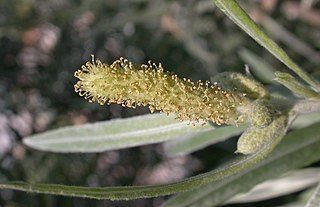
The beet armyworm or small mottled willow moth is one of the best-known agricultural pest insects. It is also known as the asparagus fern caterpillar. It is native to Asia, but has been introduced worldwide and is now found almost anywhere its many host crops are grown. The voracious larvae are the main culprits. In the British Isles, where it is an introduced species and not known to breed, the adult moth is known as the small mottled willow moth.

Cymothoa exigua, or the tongue-eating louse, is a parasitic isopod of the family Cymothoidae. It enters fish through the gills. The female attaches to the tongue, while the male attaches to the gill arches beneath and behind the female. Females are 8–29 mm (0.3–1.1 in) long and 4–14 mm (0.16–0.55 in) wide. Males are about 7.5–15 mm (0.3–0.6 in) long and 3–7 mm (0.12–0.28 in) wide. The parasite severs the blood vessels in the fish's tongue, causing the tongue to fall off. It then attaches itself to the remaining stub of tongue and the parasite itself effectively serves as the fish's new "tongue".

Salix exigua is a species of willow native to most of North America except for the southeast and far north, occurring from Alaska east to New Brunswick, and south to northern Mexico. It is considered a threatened species in Massachusetts while in Connecticut, Maryland, and New Hampshire it is considered endangered.

Iflaviridae is a family of positive sense RNA viruses insect-infecting viruses. Some of the insects commonly infected by iflaviruses include aphids, leafhoppers, flies, bees, ants, silkworms and wasps. The name "Ifla" is derived from the name "Infectious flacherie virus", a member species. There is one genus (Iflavirus) and 16 species in this family.

Stephanomeria exigua, the small wirelettuce, is a perennial or biennial plant native to the western United States. It is thought to be the parent species of Stephanomeria malheurensis, an endangered plant species found only in southern Oregon. It generally blooms from mid-spring to late summer and produces small, light pink or light purple blooms.

Sternotomini is a tribe of longhorn beetles of the subfamily Lamiinae. It was described by Thomson in 1860.

Freadelpha is a genus of longhorn beetles of the subfamily Lamiinae, containing the following species:
Freadelpha chloroleuca is a species of beetle in the family Cerambycidae. It was described by Harold in 1879.
Freadelpha cinerea is a species of beetle in the family Cerambycidae. It was described by James Thomson in 1878.
Freadelpha coronata is a species of beetle in the family Cerambycidae. It was described by Karl Jordan in 1896.

Freadelpha eremita is a species of beetle in the family Cerambycidae. It was described by John O. Westwood in 1845, originally under the genus Lamia. It has a wide distribution in Africa.
Freadelpha holoviridis is a species of beetle in the family Cerambycidae. It was described by Stephan von Breuning in 1977.
Freadelpha principalis is a species of beetle in the family Cerambycidae. It was described by Dalman in 1817, originally under the genus Lamia. It has a wide distribution in Africa.
Freadelpha rex is a species of beetle in the family Cerambycidae. It was described by Karl Jordan in 1903.
Freadelpha amoena is a species of beetle in the family Cerambycidae. It was described by Westwood in 1841. It is known from the Republic of the Congo, the Democratic Republic of the Congo, and Ghana.
Freadelpha burgeoni is a species of beetle in the family Cerambycidae. It was described by Stephan von Breuning in 1935.
Freadelpha confluens is a species of beetle in the family Cerambycidae. It was described by Harold in 1879. It is known from Tanzania, the Democratic Republic of the Congo, Angola, and Zambia.
Freadelpha leucospila is a species of beetle in the family Cerambycidae. It was described by Karl Jordan, in 1903. It is known from the Republic of the Congo, the Democratic Republic of the Congo, and Equatorial Guinea.
Freadelpha murrayi is a species of beetle in the family Cerambycidae. It was described by Chevrolat in 1855. It is known from Gabon, Cameroon, and Nigeria.

Freadelpha polyspila is a species of beetle in the family Cerambycidae. It was described by Harold in 1879. It is known from the Democratic Republic of the Congo, Tanzania, Angola, Zambia, and Malawi.







